Legendary fund manager Li Lu (who Charlie Munger backed) once said, 'The biggest investment risk is not the volatility of prices, but whether you will suffer a permanent loss of capital.' It's only natural to consider a company's balance sheet when you examine how risky it is, since debt is often involved when a business collapses. We can see that Okong Corporation (KOSDAQ:045060) does use debt in its business. But the real question is whether this debt is making the company risky.
When Is Debt A Problem?
Generally speaking, debt only becomes a real problem when a company can't easily pay it off, either by raising capital or with its own cash flow. If things get really bad, the lenders can take control of the business. While that is not too common, we often do see indebted companies permanently diluting shareholders because lenders force them to raise capital at a distressed price. By replacing dilution, though, debt can be an extremely good tool for businesses that need capital to invest in growth at high rates of return. The first thing to do when considering how much debt a business uses is to look at its cash and debt together.
View our latest analysis for Okong
What Is Okong's Net Debt?
As you can see below, Okong had ₩18.3b of debt at September 2020, down from ₩24.2b a year prior. However, its balance sheet shows it holds ₩36.2b in cash, so it actually has ₩18.0b net cash.

How Strong Is Okong's Balance Sheet?
The latest balance sheet data shows that Okong had liabilities of ₩41.5b due within a year, and liabilities of ₩6.09b falling due after that. On the other hand, it had cash of ₩36.2b and ₩21.7b worth of receivables due within a year. So it can boast ₩10.4b more liquid assets than total liabilities.
This short term liquidity is a sign that Okong could probably pay off its debt with ease, as its balance sheet is far from stretched. Succinctly put, Okong boasts net cash, so it's fair to say it does not have a heavy debt load!
And we also note warmly that Okong grew its EBIT by 12% last year, making its debt load easier to handle. There's no doubt that we learn most about debt from the balance sheet. But it is Okong's earnings that will influence how the balance sheet holds up in the future. So when considering debt, it's definitely worth looking at the earnings trend. Click here for an interactive snapshot.
Finally, a company can only pay off debt with cold hard cash, not accounting profits. Okong may have net cash on the balance sheet, but it is still interesting to look at how well the business converts its earnings before interest and tax (EBIT) to free cash flow, because that will influence both its need for, and its capacity to manage debt. Over the last three years, Okong recorded free cash flow worth a fulsome 99% of its EBIT, which is stronger than we'd usually expect. That puts it in a very strong position to pay down debt.
Summing up
While we empathize with investors who find debt concerning, you should keep in mind that Okong has net cash of ₩18.0b, as well as more liquid assets than liabilities. The cherry on top was that in converted 99% of that EBIT to free cash flow, bringing in ₩15b. So is Okong's debt a risk? It doesn't seem so to us. There's no doubt that we learn most about debt from the balance sheet. But ultimately, every company can contain risks that exist outside of the balance sheet. We've identified 1 warning sign with Okong , and understanding them should be part of your investment process.
When all is said and done, sometimes its easier to focus on companies that don't even need debt. Readers can access a list of growth stocks with zero net debt 100% free, right now.
When trading Okong or any other investment, use the platform considered by many to be the Professional's Gateway to the Worlds Market, Interactive Brokers. You get the lowest-cost* trading on stocks, options, futures, forex, bonds and funds worldwide from a single integrated account. Promoted
New: AI Stock Screener & Alerts
Our new AI Stock Screener scans the market every day to uncover opportunities.
• Dividend Powerhouses (3%+ Yield)
• Undervalued Small Caps with Insider Buying
• High growth Tech and AI Companies
Or build your own from over 50 metrics.
This article by Simply Wall St is general in nature. It does not constitute a recommendation to buy or sell any stock, and does not take account of your objectives, or your financial situation. We aim to bring you long-term focused analysis driven by fundamental data. Note that our analysis may not factor in the latest price-sensitive company announcements or qualitative material. Simply Wall St has no position in any stocks mentioned.
*Interactive Brokers Rated Lowest Cost Broker by StockBrokers.com Annual Online Review 2020
Have feedback on this article? Concerned about the content? Get in touch with us directly. Alternatively, email editorial-team (at) simplywallst.com.
About KOSDAQ:A045060
Okong
Engages in the manufacture and sale of various adhesives in South Korea and internationally.
Flawless balance sheet with slight risk.
Market Insights
Community Narratives



